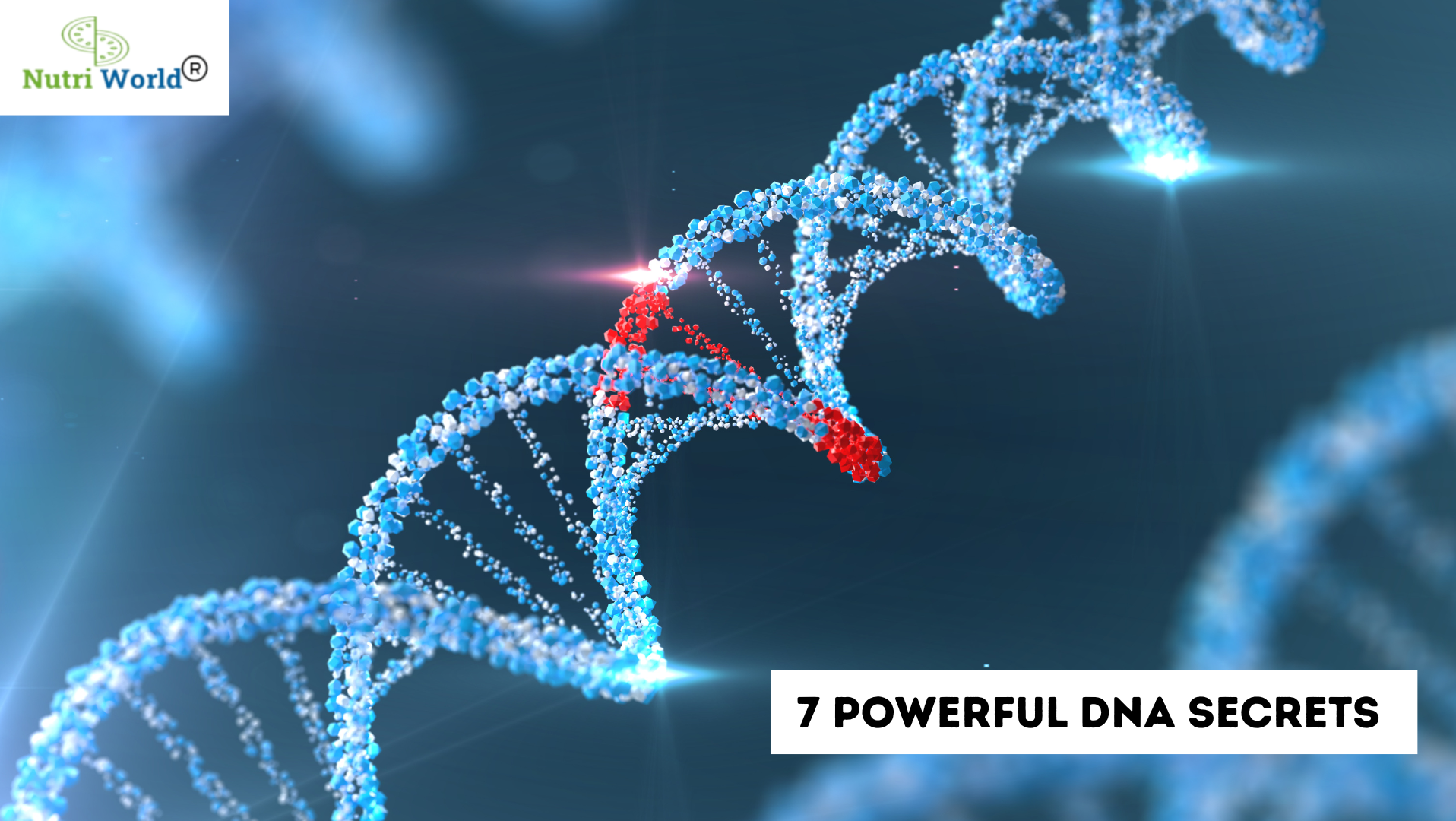By Nutriworld | Dt. Dipanwita Saha
Have you ever rolled out of bed after a full night’s sleep, only to feel drained and sleep deprived? Or perhaps you’re doing “all the right things,” such as eating well, exercising regularly, maintaining a balanced lifestyle, but still struggling with low energy?
If this resonates with you, you’re far from being alone.
The missing piece of the puzzle might lie deeper than your daily habits; it could root itself in your DNA.

Your DNA and Energy: What's the Link?
Your genes affect your physical traits, like eye colour and height. They also play a big role in how your body makes and uses energy. Some people have genes that help them process nutrients better. Others can manage stress with greater effectiveness. But here’s the empowering part: your genes are not your destiny.
Thanks to epigenetics, we understand how your lifestyle and environment affect gene expression. Now we know how your genes impact your body’s function. By adopting certain habits, you can “switch on” the genes supporting your energy and vitality.
Here are 7 DNA-based strategies to turn fatigue into lasting energy. Let’s get started!
1. Power Up Your Mitochondria—Your Cellular Energy Generators
Symptoms: midday crashes, mental fog, slow recovery.
Mitochondria are tiny structures in your cells that generate most of your body’s energy. It’s like a battery that provides energy for your body’s daily needs. Genetic variations can reduce their efficiency at work. This leads to energy dips.
What you can do:
- Eat mitochondrial-boosting foods like wild salmon, spinach, dark chocolate, beets, and turmeric.
- Supplement with CoQ10, a nutrient that enhances mitochondrial
- Try intermittent fasting for 12 to 14 This process can trigger mitophagy, which aids in the natural repair of your cells.
- Mix brisk walks, HIIT, or gentle cardio This mix will boost your energy metabolism.
- Walk barefoot on grass or sand for 15–20 minutes This practice helps to reduce inflammation.
Result: higher stamina, sharper brain function, and reduced fatigue.
2. Enhance nutrient absorption with Smarter Methylation Support.
Symptoms: Brain fog, low mood, nutrient deficiencies
Some genes influence how well you process B vitamins, such as folate and B12. These vitamins are crucial for making energy and detoxifying your body. Poor methylation leads to sluggishness and mood swings.
What you can do:
- Include methylation-supporting foods like leafy greens, lentils, eggs, and
- Take methylated B vitamins (like methylcobalamin and methylfolate) for better absorption.
- Manage homocysteine levels using TMG (trimethylglycine) or foods like quinoa and beetroot.
- Include zinc-rich foods like pumpkin seeds, chickpeas, and cashews.
Result: balanced energy, clearer thinking, and an uplifted mood.
3. Activate vitamin D for hormonal and energy health.
Symptoms: Low immunity, fatigue, sleep disturbances
Vitamin D supports mood, immunity, and cellular energy. But certain gene variants make it harder for your body to activate this vital nutrient.
What you can do:
- Get morning sunlight (7–10 am) for 20 minutes
- Take a high-quality vitamin D3 + K2 supplement in liposomal or emulsified
- Pair vitamin D with healthy fats like ghee, olive oil, or avocado for optimal
- Check your levels. Aim for a blood test range of 20–50 ng/ml. (https://ods.od.nih.gov/factsheets/VitaminD-HealthProfessional/)
Result: Stronger immunity, balanced hormones, and natural energy flow.
4. Reset Your Circadian Rhythm—Sync with Your Body Clock
Symptoms: Grogginess, poor sleep, energy dips
Your circadian rhythm, influenced by your DNA, controls sleep, digestion, and energy levels. Disruption can drain your energy, especially if you tend to be a night owl by nature.
What you can do:
- Follow a consistent sleep-wake schedule, even on
- Get sunlight within 30 minutes of waking up to reset your internal
- Avoid blue light (phones/laptops) an hour before
- Consider natural supplements like magnesium glycinate or low-dose melatonin (under supervision).
- Avoid napping during the
- Limit caffeine intake after 2 It can lead to insomnia if consumed in large amounts, disturbing your sleep cycle.
Result: deep sleep, energised mornings, and better hormone balance.
5. Fight oxidative stress to protect energy reserves.
Symptoms: Early aging, muscle fatigue, burnout
Your body always battles oxidative stress and inflammation. Your genes influence how well your body deals with stress, pollution, and bad food. This damage can leave you feeling drained and fatigued.
What you can do:
- Add antioxidant-rich foods like berries, turmeric, green tea, and dark
- Supplement with NAC (N-Acetyl Cysteine), glutathione, and selenium for cellular protection.
- Practice deep breathing, yoga, or slow movement to reduce inflammation and oxidative load.
- Stay hydrated to feel When you don’t drink enough fluids, fatigue is the first sign of dehydration.
Result: Radiant skin, mental clarity, and long-lasting energy.
6. Fuel According to Your Genetic Energy Type (Fat vs. Carb Burner)
Symptoms: Food cravings, post-meal drowsiness, weight gain
Your genes can affect how well you burn fats or carbohydrates. Eating against your genetic type can leave you drained and sluggish.
What you can do:
- Know what fuels your body best: try different macronutrient ratios and see how you feel.
- Fat burners: Focus on healthy fats (nuts, seeds, olive oil, coconut) and moderate protein.
- Carb burners: Prioritise complex, low-GI carbs like millets, quinoa, oats, and sweet potatoes.
Result: No more energy crashes or sugar slumps; clean, sustainable energy.
7. Master Stress Response Based on Your DNA Sensitivity
Symptoms: Anxiety, sleep issues, burnout
Some people feel stress with greater intensity. This is because their bodies produce more cortisol. Unmanaged stress can lead to a significant depletion of your energy reserves.
What you can do:
- Integrate daily stress-relief rituals like mindfulness, journaling, or nature
- Practice yoga, pranayama, or guided meditation to calm the nervous
- Support neurotransmitters with magnesium glycinate and vitamin B6.
- Drink adaptogen-rich teas like ashwagandha, rhodiola, or tulsi to support adrenal health.
Result: Strong emotional resilience, reduced cortisol levels, and consistent energy all day.
Final Thoughts: DNA is the blueprint, but lifestyle is the architect.
Your DNA is the blueprint, but your lifestyle brings it to life. Match your habits to your strengths. Feed your body well. Believe that you can refresh your energy from within. Start today with small, consistent choices to make powerful shifts.
Energy is not about effort; it’s about alignment.
Pro Tip :
Curious about your DNA? Think about getting a simple DNA test. Next, team up with a nutrition or wellness expert to customise your energy plan. When your habits match your genetics, everything flows better, from workouts to workdays.
BY, Shruti Srinivasan



